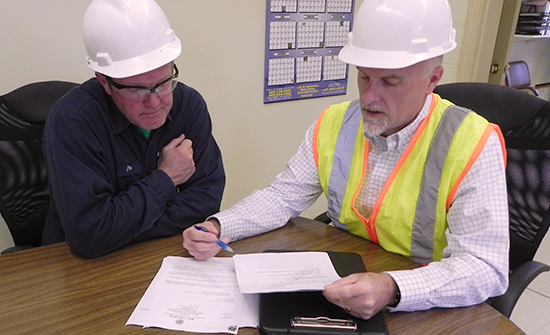Your environmental audit results and findings can carry some serious weight with them.
While many folks already know what an environmental audit is, we find that many folks have some serious concerns about what to do with the outcome. It's no suprise, since the results of an audit can highlight the fact that you're not following the rules, laws, and regulations you should be.
We get it. Chances are not every facility out there is following 100% of the rules and regulations it should be. Especially if you don't have an environmental manager, or you're a newer operation struggling to comprehend the ins and outs of the often times complicated set of environmental laws out there.
Fortunatley, depending on how you complete your environmental audit, you have some options about what has to happen at the end of the process. Depending on who and how your audit is completed, you may or may not have to report the findings to anyone, so let's discuss it in-depth here.
Do I have to report the findings of my environmental audit?
Let's get this out of the way up front.
We're not lawyers.
We are not offering you legal advice.
Always, always, always check with legal counsel before doing anything that might put you in jeopardy, so that you know what you’re getting yourself into, and you can make informed decisions.
Ok, now that that's out of the way, let’s consider three basic scenarios:
Reporting environmental audit findings at a facility with a spill or release.
Lets say you get an audit completed, and the results point out that you're out of compliance. Not good, but usually not the end of the world, depending on the severity of the regulation you're not in compliance with.
But, lets say that by being out of compliance you've been releasing a chemical,
A facility finds out they aren’t in compliance one way or the other, or discover that their activities have resulted in the release of a hazardous material. In this case, the facility has a problem, and should certainly consult legal counsel and an environmental consultant. Non-compliance has to be addressed and a report-able release has to be reported. In both cases, you have an obligation to address the situation, and you may suffer consequences including regulatory enforcement action and fines depending on the underlying causes of the matter. Not the greatest option, but still better than doing nothing. So in this scenario, yes, if you started an audit and discovered a spill or release, you would have to report the results of the audit.
- A Facility with No Spills - An industrial facility hires an environmental consultant to conduct a comprehensive audit, and during the audit some regulatory deficiency or environmental release is found. Same reporting obligations pertain. But if the discovery was made under an audit, you can usually get some form of immunity under your state’s “audit immunity” program or the USEPA’s Audit Policy, provided certain provisions are met. While this won’t completely let you off the hook, it usually offers a lot of protection if you found the issues, self-reported them, and proactively take steps to address the situation. It's a pretty good option, and one which we use regularly. In this case you're reporting on some aspects of the results.
- A Facility Who Hires an Attorney - You can utilize a concept known as “attorney-client privilege”. The layman’s version is this: what is discussed between an attorney and their client is privileged information. Say an attorney hires an environmental consultant to conduct an audit. The environmental consultant reports back to the attorney and the attorney now can discuss the findings with the facility under their attorney-client privilege, and everyone’s findings are protected. This can buy some breathing room to develop a course of action, before “going public” by reporting the issues and taking care of them. You also have the benefit of legal counsel and a good environmental consultant should the results become a serious legal issue or penalty situation. Note that in this circumstance, you can still use audit immunity if you choose, provided you meet the requirements and provisions of the immunity program (which often include time constraints on reporting after date of discovery). We also do this a lot with attorneys, and this clearly is your best choice. An attorney could tell you better, but in this scenario you may not have to necessarily have to report the findings.
.png)
Reporting your Environmental Audit Findings
Given the possibility of fines, penalties, or shutting your facility down due to being out of compliance, I always recommend facilities look into audits. You may have nothing to report. You might be able to just "start" being in compliance by following the rules.
However if your facility has had a release or accident, which could have caused a threat to the environment or human health or safety, then an audit is probably going to be a requirement by the regulatory agency that's going to enforce regulations. In this case, you would most likely need to submit your findings to the applicable agencies.
For additional information, check out our article on the Top 5 Things to Know About Environmental Audits as well as our article on Phase I Environmental Site Assessments vs. Audits.
And remember, none of this information is meant to be legal advice. You should always seek legal counsel before proceeding with an audit.
For additional information on audits, click here to contact us or call us at 609-693-8301 to discuss your environmental challenges.


.png)